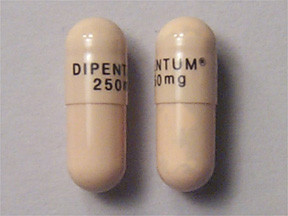OLSALAZINE - ORAL
PHONETIC PRONUNCIATION: (ohl-SAL-uh-zeen)
COMMON BRAND NAME(S): Dipentum
GENERIC NAME(S): olsalazine sodium
Uses
USES: Olsalazine is used to treat a certain type of bowel disease called ulcerative colitis. It does not cure ulcerative colitis, but it may decrease symptoms such as stomach pain, diarrhea, and rectal bleeding caused by irritation/swelling of the colon/rectum. After an attack is treated, olsalazine is used to increase the amount of time between attacks. Olsalazine is a salicylate anti-inflammatory drug. It is believed to work by blocking the production of certain natural substances (e.g., prostaglandins) that may cause pain and swelling.
How to use OLSALAZINE - ORAL
HOW TO USE: Take this medication by mouth, usually twice a day about 12 hours apart or as directed by your doctor. Take with food or after meals to prevent stomach upset. Dosage is based on your medical condition and response to treatment. Use this medication regularly in order to get the most benefit from it. To help you remember, use it at the same times each day. Tell your doctor if your condition persists or worsens.
Side Effects
Precautions
Interactions
Overdose
Images
Reviews
Faq for OLSALAZINE - ORAL
Olsalazine is a medication that belongs to a class of drugs known as anti-inflammatory agents. It is prescribed to treat certain bowel conditions, such as ulcerative colitis.
Olsalazine works by reducing inflammation in the intestines. It is converted into active compounds in the body, which help to control the symptoms of ulcerative colitis.
The recommended dosage of Olsalazine varies depending on the severity of the condition being treated. It is typically taken orally, usually in divided doses, with or without food. It is important to follow your doctor's instructions and never exceed the prescribed dosage.
Common side effects of Olsalazine may include headaches, nausea, abdominal pain, diarrhea, and allergic reactions. If you experience any severe or persistent side effects, it is important to contact your healthcare provider.
It is important to consult your healthcare provider before taking Olsalazine if you are pregnant or planning to become pregnant. Olsalazine may not be recommended during pregnancy unless the potential benefits outweigh the risks.
Yes, Olsalazine may interact with certain medications. It is important to inform your healthcare provider about all the medications you are taking, including prescription, over-the-counter, and herbal products, to avoid any potential drug interactions.
The time it takes for Olsalazine to start working may vary depending on the individual and the severity of the condition being treated. It is important to continue taking the medication as prescribed and consult your healthcare provider if you do not notice any improvement in your symptoms.
Olsalazine can be taken with or without food. However, taking it with food may help reduce the risk of stomach upset. Follow the instructions provided by your healthcare provider or refer to the medication label for specific guidance on how to take Olsalazine.
Long-term effects of using Olsalazine are not typically reported, but it is important to monitor your health closely while taking this medication. Regular check-ups with your healthcare provider are important to assess the effectiveness and safety of Olsalazine treatment.
Disclaimer
IMPORTANT: HOW TO USE THIS INFORMATION: This is a summary and does NOT have all possible information about this product. This information does not assure that this product is safe, effective, or appropriate for you. This information is not individual medical advice and does not substitute for the advice of your health care professional. Always ask your health care professional for complete information about this product and your specific health needs.

No Reviews Yet